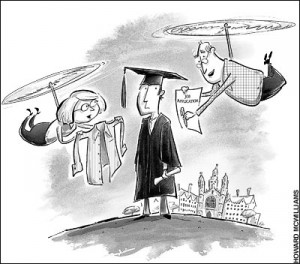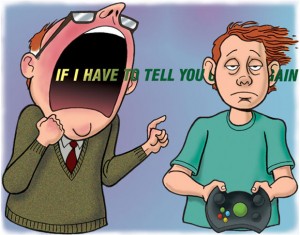My son Scott is now in Korea serving his remaining 22 months, after a two-month language training period. Here is my most recent letter to him.
Dear Elder Himmer,
On 24 March, two weeks ago, as I sat in church, I wrote the following notes and if you can open a pdf file, I will provide the charts that I scribbled on the back of my notes.
The construct of agency is feared by the adversary and often misunderstood by the faithful. In lieu of agency, parents often protect their offspring from the consequences of their choices. Such behavior is universally couched in the attitude of love, but with the resulting consequences of control and unrighteous dominion. When parents exercise this version of love, the resulting behavior of their children is often in opposition to their righteous desires.
No amount of desire, love, or care can alter the resulting behavior of those who are manipulated, controlled, coerced, and who have their agency removed by their parents or leaders.
These parents are usually unaware that they have removed agency and what they fear is uncertainty. Lucifer used uncertainty as an excuse to cover his vain ambitions in the pre-mortal war. Without an intervening veil, each of us saw through his deceit and opted to receive moral agency and the dangers associated with uncertainty.
The process of obtaining certainty is not through control, micromanaging, and an smothering protection of rules and guidelines that restrict growth and learning. Such behavior is couched in our secular world as Helicopter Parenting and leads to “Learned Helplessness.” In the LDS vernacular, we refer to this as “unrighteous dominion.”
Let’s take the example of a new freshman student at the university who has been rescued his entire life by a loving mother. In the weeks leading up to his first exams, he enjoys the new found freedom of coming and going at will. He capitalizes on the social life now available without the hovering restraints of a mother who once oversaw all his activities. After failing his first three tests and his mother’s attempt to influence his professors are rejected, the mother suggests her boy come home to the protection of her outspread wings.
The Lord has given us a pathway that removes uncertainty and increases predictability, if we choose to accept the associated immediate pain. This life is a time for us to be tested, not coddled or protected. The human fear of uncertainty is manifested in countless studies on the universal fear we have for change. The pain associated with change is always immediate, but with time and repeated behavior, the pain dissipates until it becomes the new norm.
In opposition to learning a new behavior, keeping an existing, but harmful behavior is also painful. However, the pain is a known quantity and can be temporarily mollified through acting out of harmony with the Lord’s will. Helo-parenting is a socially acceptable behavior addiction that coddles children and removes agency. The ultimate pain of the behavior is manifested in an adult who is incapable of dealing with the realities of life outside the home.
The ability to experience emotional intimacy (mutual trust and respect) is negated by having never experienced the construct (emotional intimacy) in his young life. This process illustrates the damning effects of socially acceptable behavior addictions learned from families of origin and void of a personal awareness that they exist.
Such behaviors are often not recognized as harmful, but the lack of recognition does not dissipate the harmful results and pain associated with acting out.
Here is a short list of socially acceptable behavior addictions that often manifest themselves in families all across the world: sarcasm, criticism, demeaning, yelling, blaming, one-upping, relating (always finding commonalities), avoiding conflict, having to be right, and always attempting to get others to see your point of view (seeking agreement).
These behaviors are referred to as endogenous addictions, or addictions from within. For the most part, such behavior is accepted as normal, everybody does it, and, that’s just the way I am.
However, to our society and within the church, the exogenous addictions get all the attention. They are shunned, looked down upon, and usually judged.
Consider the Temple Recommend interview. If you are guilty of any one of the following exogenous (external) addictions—smoking, drinking, and drugs, you are not invited to attend the temple. We are sometimes repulsed when sitting next to someone who reeks of their exogenous addiction. We look with disdain at someone whose face is pock marked and whose arms are needle marked from years of drug addictions.
 And while we stand in derision to the exogenous misfortunate, we herald and embrace parents who force their children into church attendance for 18 years. We justify controlling and enabling behavior because their intent is virtuous. And when the inevitable consequences of church inactivity occur we feel remorse for the parents with judging disdain of their children when they leave the church.
And while we stand in derision to the exogenous misfortunate, we herald and embrace parents who force their children into church attendance for 18 years. We justify controlling and enabling behavior because their intent is virtuous. And when the inevitable consequences of church inactivity occur we feel remorse for the parents with judging disdain of their children when they leave the church.
We comfort the parents with promises of their prodigal children’s return, because the prophets taught the doctrine of a righteous upbringing. We assure the parents that since they held FHE and family prayer, and since the children were taught correct principles, they will one day return.
To teach is to delegate the learning to the children. Learning is the process of self-discovery. Teaching is an invitation to the table of learning. Teaching is not forcing, persuading, manipulating, rescuing, or enabling.
I end this epistle with the following question. When were the prodigal children taught correct principles?
Love,
dad
Click here for Agency vs. Control diagram 1
Click here for Agency vs. Control diagram 2
